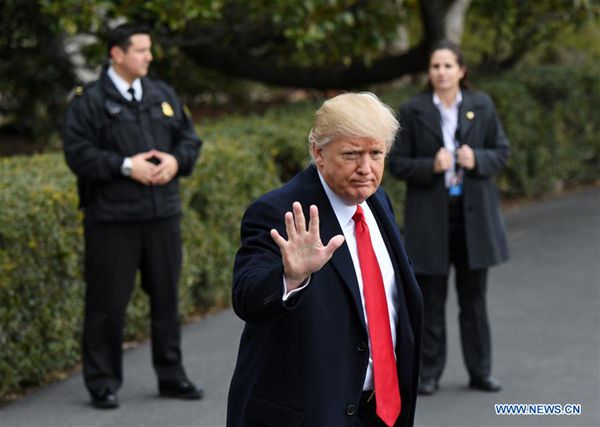One China policy, Trump's two faces
china.org.cn / chinagate.cn by Kyle Calandra, February 16, 2017 Adjust font size:
|
|
|
U.S. President Donald Trump (C) gestures to media before boarding Marine One departing for Andrews Air Force Base en route to West Palm Beach, Florida, at White House in Washington D.C.,the United States, Feb. 3, 2017. (Xinhua/Yin Bogu) |
"I fully understand the 'One China' policy," said Trump, appearing on Fox News Sunday's December 11 broadcast, "But I don't know why we have to be bound by a 'One China' policy unless we make a deal with China having to do with other things, including trade."
Trump previously incited controversy when he ignored four decades of diplomatic protocol between the United States and China with his phone call to Taiwanese leader Tsai Ing-wen on December 2, 2016.
Following Trump's comments on Fox News Sunday, a Global Times editorial accused Trump of being as "ignorant as a child in terms of foreign policy," and also taking a firm stance in dismissing any negotiations surrounding the One China policy.
According to a Financial Times article, Beijing "warned Donald Trump that the two countries will have 'nothing to discuss'" if any mention of negotiating the policy continued, hinting that diplomatic relations might be suspended outright.
Roughly two months after suggesting that the widely regarded bedrock of Sino-U.S. relations should be reconsidered, "Trump used a Thursday night (February 9) phone call with Chinese President Xi Jinping to say that he would honor the so-called 'One China' policy," says Zeeshan Aleem writing for Vox.com.
A Whitehouse press release issued on the same day states, "The two leaders discussed numerous topics and President Trump agreed, at the request of President Xi, to honor our 'One China' policy," stressing that "President Trump and President Xi look forward to further talks with very successful outcomes."
According to Aleem, "The call took place one day after Trump first extended his hand to China, when National Security Adviser Michael Flynn hand-delivered a letter to China's ambassador saying the U.S. was looking forward to building 'constructive relations' with China."
Trump seems to have suddenly become aware of what foreign policy experts already knew; threatening the One China policy jeopardizes any hope of continued relations and strangles the long existing diplomatic protocol between the two countries.
The policy has been a key feature for a number of reasons, the chief of which is, simply, because of the complexity of Sino-U.S. relations.
"Every U.S. president since Nixon has come into office promising to be tough on China, and every single one of them has backed off when they realize the complexity of the situation," said David Kang, a professor of international relations at the University of Southern California, during an interview in January with Aleem.
China might see Trump's apparent reversal as a calming reassurance given the two countries' increasingly complex relationship.
In a Foreign Policy article titled, The Chinese Learned that Trump Blinks, the writers cautiously remind everyone that "talk is cheap." Given Trump's infamously erratic and unpredictable behavior and the Taiwanese leader's continued refusal to affirm the 1992 consensus regarding the One China policy, China might think twice before reflecting on any calming reassurances.
The truth is, there's a long march backwards for Sino-U.S. relations if there's any hope for a return to the relaxed, tieless diplomacy practiced by Obama and Xi at the Sunnylands estate in 2013.
With the current and future trends of Sino-U.S. relations perhaps existing as a bellwether for global stability, any political or economic landscape where Trump and China can build ties is becoming increasingly valuable real estate. However, as Trump's stance on China continually suggests an impending trade war, tensions are likely to remain relatively high.
Climate change, cyber security and counterterrorism remain practical however contentious areas in the ongoing policy debate between China and the United States. Hopefully, these topics will prove important grounds for continued collaboration and win-win cooperation.
Having previously lived in Beijing working as a journalist and editor, Kyle Calandra is currently based in America reporting on Sino-U.S. Relations as a contributor for China.org.cn.
Opinion articles reflect the views of their authors only, not necessarily those of China.org.cn.
